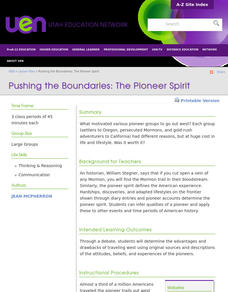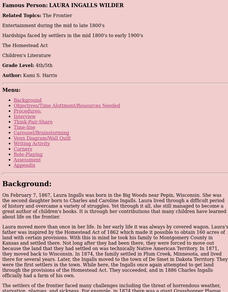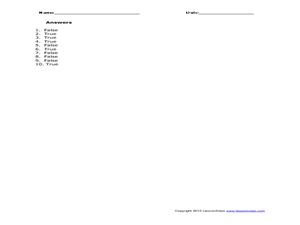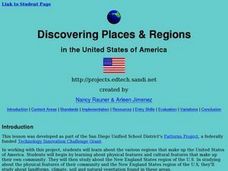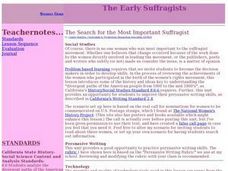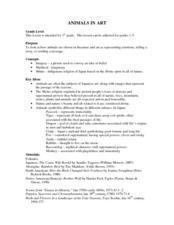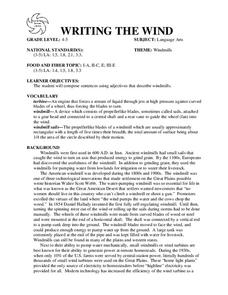Curated OER
Writing the Wind
Students make a windmill. In this wind lesson, students learn background information about the windmill, complete an activity where they create a windmill, discuss using wind as a natural resource and brainstorm other inventions that...
Curated OER
Susan B. Anthony: Rebel for the Cause
Students explore the suffragist, Susan B. Anthony, documents her life and era with photographs, illustrations, and interviews. It demonstates how this feminist leader simultaneously influenced events and was shaped by external forces.
Curated OER
Japanese Folktales for Children
Young scholars study Japanese folkart traditions and culture through storytelling, class discussions, and a creative project. The project involves students creating drawings of a pre-selected folktale and putting them together in a...
Curated OER
Pushing the Boundaries: The Pioneer Spirit
Eleventh graders recognize how social reform occurred at the turn of the century. Through a debate, 11th graders determine advantages and drawbacks of traveling west using original sources and descriptions of the attitudes, beliefs, and...
Curated OER
Nineteenth Century Family Portraits
Students compare two nineteenth century family portraits using historical data, statistics, and historical context. Students analyze their own family pictures adjusting the criteria to the current decade. Lastly students study the...
Curated OER
Arkansas and the Civil Rights Movement
In this Arkansas reading comprehension instructional activity, learners read a 2-page selection regarding the state and the Civil Rights Movement and they answer 10 true or false questions pertaining to the selection.
Curated OER
Extraordinary Women in the Great Plains
Eighth graders write what they predict were the roles women played in the Great Plains. Using the internet, they research and identify the roles they did play and use a Venn diagram to compare and contrast their predictions to the...
Curated OER
The Literature of Upheaval
In groups, 8th graders read different documents and answer questions on the Civil War period. Students read documents by Thoreau, Stowe and Frederick Douglas.
Curated OER
The Frontier
Learners, given certain background information, list hardships that Laura Ingalls Wilder and other people that lived during the same time period went through. They interview someone who grew up in a different era than them.
Curated OER
Going, Going, Ghost
Third graders research ghost towns. In this geography lesson plan, 3rd graders locate ghost towns on a map and choose one location to research. Students construct a research paper and present it to the class.
Curated OER
Remember the Alamo
Eighth graders comprehend how the siege of the Alamo and the Texas revolution laid the groundwork for the United States-Mexican War. They discuss how westward expansion led to Texas Independence. Students complete the "Remeber the...
Curated OER
We Can Dance
Fourth graders research the different kinds of dances Texans participate in. They try to dance the dances they have researched.
Curated OER
The Railroad Booms!
Learners discover how the railroads contributed to the interdependence between farms and towns. Using the railroads, they describe the effect of them on western settlement and the relationship between their location and the availability...
Curated OER
Reading Comprehension: Ohio
In this reading comprehension instructional activity, students read a 2-page article regarding Ohio and respond to 10 true or false questions regarding the selection about the state.
Curated OER
Anti-Railroad Propaganda Poster -- The Growth of Regionalism, 1800 - 1860
Young scholars research the anti-railroad movement of the mid-19th century. They review propaganda from the period and consider various points of view. They develop role-plays and write essays using their research.
Curated OER
Discovering Places & Regions
Fifth graders research physical and cultural features of a place. They practice skills in gathering information from various sources, using tools such as graphic organizers, word processing, multimedia, and use of the Internet.
Curated OER
The Information Revolution: A Hypothetical Case
Students consider the implications of the information revolution. In this information age lesson, students discuss informatics and the misuse of information. Students form a fictional bureau of information control and hold a simulated...
Curated OER
The Leadership and Impact of Booker T. Washington
Twelfth graders explore the life and leadership of Booker T. Washington. In this Booker T. Washington lesson, 12th graders examine images of Washington, listen to audio of his voice, and his most famous speech. Students wrote responses...
Curated OER
The Early Suffragists
Students research early suffragists in an effort to find the most influential leader of the movement. They give presentations and the class chooses a winner. They write letters to the postmaster suggesting they be placed on a stamp.
Curated OER
Iowa Agriculturist
Tenth graders review the Iowa Agriculturist, retell the annual and seasonal cycle of farming and describe pioneer farming practices.
Curated OER
Political Cartoons: Thinking Broadly, Communicating Succinctly
High schoolers think broadly about the tsunami disaster and its aftermath through studying cartoons. Students critically think about the literary devices the authors/artists use, such as satire, metaphor and personification.
Curated OER
Animals in Art
Students look at how animals are shown in literature and art as representing emotions, telling a story, or sending a message in this elementary school Language Arts and Visual Arts lesson.
Curated OER
WRITING THE WIND
The student will compose sentences using adjectives that describe windmills.Review adjectives. Write a noun on the board and have students name the appropriate adjectives. 2. Hand out worksheets and review directions for making windmill...
Curated OER
Why Do You Live Where You Do?
Eighth graders identify reasons why settlers bought land from the railroad and not a Homestead grant. Using that information, they compare and contrast the types of land given in each situation. They discuss the reasons why given...





